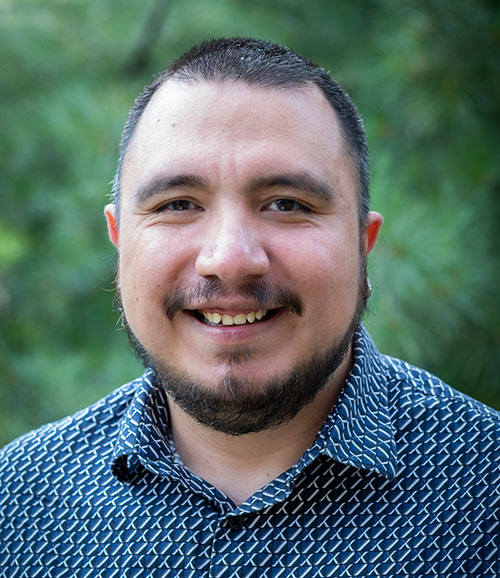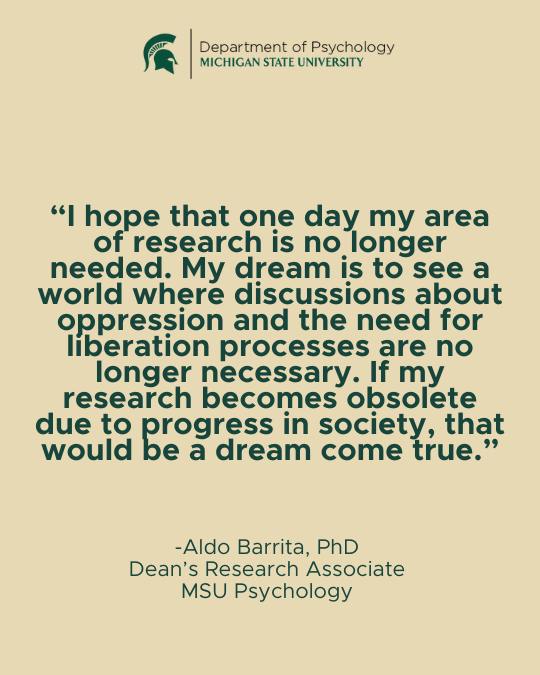Introducing Psychology’s Dean’s Research Associate Aldo Barrita
September 4, 2024 - Shelly DeJong
 Aldo Barrita (he/his/él) is a Queer Latinx Mexican Immigrant and Social Psychologist who is a new Dean’s Research Associate in the MSU Department of Psychology. He is a graduate from the Psychological and Brain Sciences Ph.D. Program at the University of Nevada, Las Vegas (UNLV), receiving a doctoral degree with an emphasis in Social, Community, and Quantitative Psychology.
Aldo Barrita (he/his/él) is a Queer Latinx Mexican Immigrant and Social Psychologist who is a new Dean’s Research Associate in the MSU Department of Psychology. He is a graduate from the Psychological and Brain Sciences Ph.D. Program at the University of Nevada, Las Vegas (UNLV), receiving a doctoral degree with an emphasis in Social, Community, and Quantitative Psychology.
Barrita’s research focus includes how different forms of discrimination, primarily microaggressions, psychologically impact individuals from marginalized communities. Specifically, he has a special interest in Latinx and/or LGBTQ+ experiences with microaggressions as well as psychometrics.
Barrita sat down with us to discuss the Dean’s Research Associates Program, what his first year will look like, and what he hopes his impact will be.
Why were you were drawn to the Dean's Research Associates Program?
I found out about the Dean's Research Associates Program in a very accidental way. I was mainly focused on applying to tenure-track jobs, but I stumbled, by chance, upon the program at Michigan State. I was drawn to how the program highlighted efforts to diversify departments and offered the same compensation as an assistant professor, breaking down financial barriers. I fell in love with the program and decided to apply. The personal touch of a call from the Associate Dean of DEI, Dr. Achebe, made the process feel more human, and during my first interview, I learned that the Psychology Department was participating for the first time and that previous fellows had successfully transitioned to tenure-track positions.
What will your first year look like in the program?
What I love about the Dean's Research Associate program is that they don't assume any prior knowledge, so they offer introductory training on various aspects like creating a class and setting up a research agenda. So, this first year will focus on training and development. They also help make connections within the university, provide training on grant writing, and introduce you to key individuals who can assist with grant applications. Collaboration with other departments is also encouraged, which I find very valuable. Another important aspect of the program is that they minimize service expectations for the first two years to allow you to focus on research and development. This will enable me to concentrate on building my research program, which is crucial as I progress toward tenure.
Being a part of this program is such a blessing. If I had gone directly into the tenure track, I would have to deal with so much. First, I'd have to adjust to moving and to a new city, but then I'd be expected to immediately jump on the tenure track - setting up a lab, taking on students. This program allows you to start slowly, learn what you need to learn to set yourself up for success. By the time you're transitioning to tenure, you already know a lot of the things that you're supposed to do.
My partner is moving with me, so I’m grateful that this program allows me to dedicate time to helping him adjust as well.
What will your lab’s research focus on?
My research focuses on the oppression and experiences of minoritized groups. I study individuals with multiple minoritized identities and explore the psychological impact of these identities. The lab will have a strong community focus, with a primary emphasis on the intersection of race, ethnicity, sexual orientation, and gender. I aim to attract graduate students interested in exploring these areas, as well as working with undergraduates from groups that are underrepresented in higher education and seeking research opportunities.
 Why did you end up studying psychology?
Why did you end up studying psychology?
When I was a child, I wanted to become a psychologist because therapy helped me a lot. As I grew up, I initially considered pursuing a career as a paralegal, but I rediscovered my passion for psychology when I took a Psych 101 course. I pursued a bachelor's degree in psychology and became interested in social justice-oriented research during my time at UC Berkeley. After working at a rehabilitation center for substance use, I realized that clinical work was not for me. I was more drawn to the systemic aspects of psychology and evidence-based practices, so I decided to focus on social psychology instead. Most of my work and collaborators are clinical or counseling psychologists, though. It's important to me to have that connection because I want my research to have practical implications and be helpful for psychologists in their practice.
What do you hope that your impact will be in academia?
I want to empower students, particularly first-generation college students, to see their potential and explore their options. Seeing people who look like you in influential roles is crucial. Mentoring undergraduates as a grad student was incredibly rewarding, and I’m eager to continue being a mentor to undergraduate students.
Long term, I hope that one day my area of research is no longer needed. My dream is to see a world where discussions about oppression and the need for liberation processes are no longer necessary. If my research becomes obsolete due to progress in society, that would be a dream come true.

